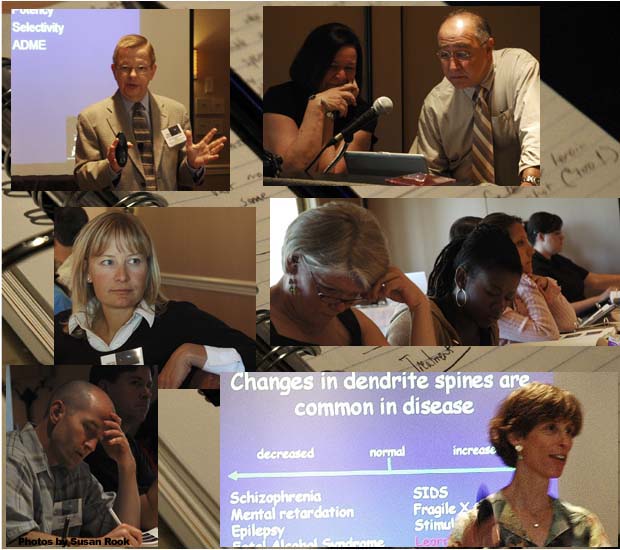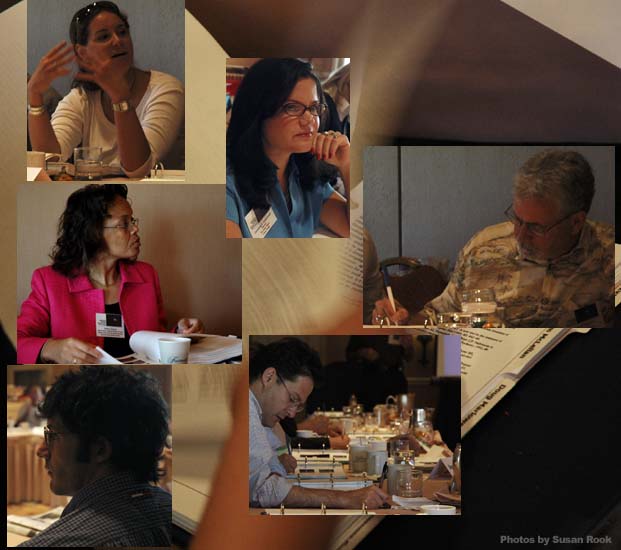
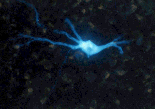
|
|
|
June 2006
Workshop
|
|
Participants
What Journalists Said
Faculty
|
June
2006 Workshop
June
16-17, 2006
Scottsdale, Arizona
The
June 2006 Workshop of the Addiction Studies Program for Journalists
was sponsored by Wake Forest University School of Medicine, National
Families in Action, and the Treatment Research Institute.
|
|
| June
2006 Workshop Participants |
| |
|
|
Patricia Beall
Reporter
Palm Beach Post
West Palm Beach, Florida
Patrick
Brendel
Health Reporter
Victoria Advocate
Victoria, Texas
Matthew
Burgard
Crime Reporter
Hartford Courant
Hartford, Connecticut
Lawrence
Buser
Courts Reporter
The Commerical Appeal
Memphis, Tennessee
Jonathan
Crawford
Graduate Student/Intern Copy Editor
Philip Merrill College of Journalism
University of Maryland
Knight Ridder/Tribune Information Services
College Park, Maryland
Douglass
Crouse
Specialty Writer
The Record
Rockaway, New Jersey
Kelly
Davis
Associate Editor
San Diego City Beat Newspaper
San Diego, California
Jonnie
Taté Finn
Regional Reporter
Lincoln Journal Star
Lincoln, Nebraska
Aaron
Gifford
Reporter
Syracuse Post-Standard
Cazenovia, New York
Richard
Holmes
Opinion Editor
MetroWest Daily News
Upton, Massachusetts
Sheryl
Kornman
Medical Reporter
Tuscon Citizen Newspaper
Tuscon, Arizona
|
|
Fred Martino
Director of News and Public Affairs
WGVU-AM/FM/TV
Grand Rapids, Michigan
Nicole
Morgan
General Assignment Reporter
The Virginian-Pilot
Norfolk, Virginia
Emily
Morris
Criminal Reporter
The Grand Junction Daily Sentinel
Grand Junction, Colorado
Leslie
Parrilla
Reporter
The Tribune
San Luis Obispo, California
Candace
J. Samolinski
Reporter
The Tampa Tribune
Tampa, Florida
Marc
Shaffer
Independent Documentary Producer
Oakland, California
Jennifer
C. Smith
Health, Environment and Science Reporter
The Monitor
McAllen, Texas
Kristen
Stewart
Social Services Reporter
The Salt Lake Tribune
Salt Lake City, Utah
G.
Robert Weigand
News/Operations Director
WZKZ-FM
Wellsville, New York
Mark
Wright
Associate Director of News/Media
Wake Forest University Health Sciences
Department of Public Relations and Marketing
Winston-Salem, North Carolina
|
|
What Journalists Said About the June 2006
Workshop |
On
the introduction to pharmacological terms:
"I enjoyed Jack's use of common every-day analogies to help a science-challenged
reporter like me understand."
"Good basic intro, mixed of humor, made it easy to follow, remain
engaged."
On
the hisory of drug abuse in the U.S.:
"Sue's presentation was very informative on the development of
drug laws in response to rates of use."
"Again, very informative; a lot of important data made easily digestible."
On
the neurobiology of addiction:
"Excellent primer on neurobiology of addiction - presented in an
easily accessible way."
"Informative - relevant comparison of addiction to other physical
diseases."
"Excellent! Enjoyed the science more than I expected."
On
adolescence and addiction:
"I'll get a full column out of this one alone."
"Interesting - this is kind of info that informs, even surprises
readers - and it's easily understood."
On
the personal side of addiction:
"Talk about relevancy - a true addiction story from a first person
point of view - a perfect presentation for this program."
"Susan's courage and generosity to share her own story of addiction
was invaluable. It provides the perfect "real-world" balance
to the science and policy discussions."
On
the treatment of addiction:
"Chuck's presentation really helped by moving the basic science
we learned on Friday into real-world treatment of addicts. His description
of medicines and discussion of that controversy were very informative."
"Outstanding presentation of data - well structured - excellent
knowledge of related issues for those who asked questions."
On
the effectiveness of addiction treatment:
"One of the more interesting and relevant lectures. I learned the
level of availability of treatment options and what the problems are.
I can definitely see this relating to the readers."
"Good humor; puts information in easily accessible terms for lay
people. Liked his use of 'obvious' questions to use as straw men to
drive learning. His focus on evidence-based care and onus for outcome
on PROVIDERS very valuable."
|
|
On
treating the offender population:
"Very good overview of criminal justice system-based coerced treatment.
Great description of treatment outcomes, especially after McLellan's
more positive view."
"Enjoyed this discussion immensely, mostly because he is very blunt
about all the gray areas involved and the debate over alternatives."
On
the effectiveness of substance abuse prevention:
"Good conversation, good story ideas."
"Great speaker - appreciated his willingness to engage in Q&A."
Overall
impressions:
"The program was even more intense than I expected and gave me
a lot of good information. I appreciated the quality and variety of
speakers."
"Got a good understanding of biology as it pertains to drugs and
behavior."
"The program met my expectations - surpassed my expectations -
providing me with a depth and breadth of understanding."
"A privilege to learn from the leading researchers in the field.
Excellent effort to get real story out through informed media. Thanks."
How
participants think the workshop will help them with their reporting
on substance abuse:
"I better understand why addicts are the way they are. Prior to
the conference, I definitely thought, 'Why can't they just stop?'"
"I now have a greater understanding of addiction as a disease,
just like hypertension or congestive heart failure, that is dangerously
misunderstood."
"Thought I was informed - but I only knew enough to be dangerous.
Thanks for helping me - and my readers - out."
What
participants liked most about the workshop:
"Speakers were engaging and authoritative and provocative."
"Small setting, diverse group (geographically, age-wise). Appreciated
the professionalism and expertise."
"Chances to ask so many questions. The resources and sources were
amazing."
"Quality/credentials of speakers/presentations. Location. Atmosphere."
|
|
June
2006 Workshop Faculty |
David Friedman, Ph.D.
Director, Addiction Studies Program for Journalists
Professor
Department of Physiology and Pharmacology
Wake Forest University School of Medicine
Winston-Salem, North Carolina Sue
Rusche
Co-Director
Addiction Studies Program for Journalists
Chairman, President, and CEO
National Families in Action
Atlanta, Georgia
A.
Tom McLellan, Ph.D.
Director, Treatment Institute
University of Pennsylvania
Philadelphia, Pennsylvania
Douglas
B. Marlowe, J.D., Ph.D.
Director, Section on Criminal Justice Research
Treatment Research Institute
University of Pennsylvania
Philadelphia, Pennsylvania
Charles
P. O'Brien, M.D., Ph.D.
Kenneth Appel Professor
Vice Chair of Psychiatry
University of Pennsylvania
|
|
Chris Ringwalt, Ph.D.
Senior Research Scientist and Center Director
Pacific Institute for Research and Evaluation
Chapel Hill, North Carolina
Susan
Rook
Recovery Advocate
Faces and Voices of Recovery
Alexandria, Virginia
Rochelle
"Shelly" Schwartz-Bloom, Ph.D.
Professor of Pharmacology
Duke University Medical Center
Department of Pharmacology and Cancer Biology
Durham, North Carolina
Jack
W. Strandhoy, Ph.D.
Professor
Wake Forest University School of Medicine
Department of Physiology and Pharmacology
Winston-Salem, North Carolina
Ken
C. Winters, Ph.D.
Professor, Department of Psychiatry
Director, Center for the Adolescent Substance Abuse Research
University of Minnesota
Minneapolis, Minnesota
|
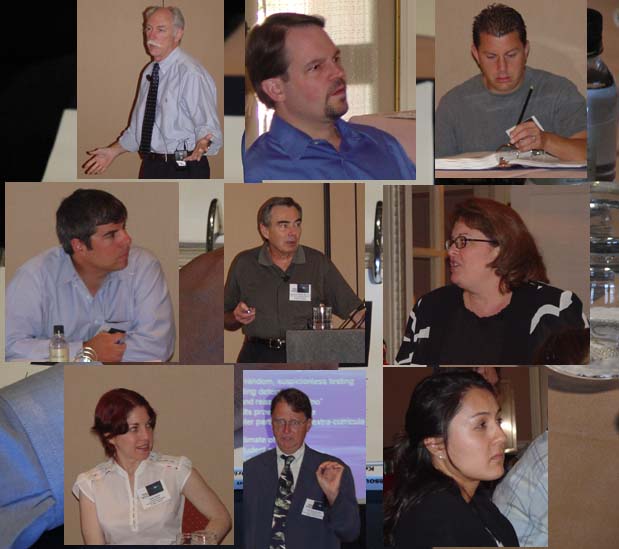 |
June 2006 Workshop Agenda
|
Friday, June 16
8:00
Welcome and Introductions
David Friedman and Sue Rusche
8:15
Introduction to Pharmacological Terms
Jack Strandhoy
9:15
A History of Drug Abuse and Addiction in the U.S.
Sue Rusche
10:15
Break
10:30
The
Neurobiology of Addiction I
David Friedman
12:00
Lunch
1:30
The Neurobiology of Addiction II
Shelly Schwartz-Bloom
3:00
Break
3:15
Adolescence, A Major Risk Factor for Addiction
Ken Winters
4:45
Evaluations
5:15
Adjourn
6:30
Reception
7:00
Dinner
Speaker - Susan Rook
|
|
Saturday, June 17
9:00
The Treatment of Addiction
Charles O'Brien
10:30
Break
10:45
Is Addiction Treatment Effective?
Tom McClellan
12:15
Lunch
1:30
Treating the Offender Population
Doug Marlowe
3:00
Break
3:15
Prevention: What Works, What Doesn't
Chris Ringwalt
4:45
Scientifically Reliable Information About Drugs
Sue Rusche
5:15
Evaluations
5:30
Introduction to CPDD Mentors
6:00
Adjourn |
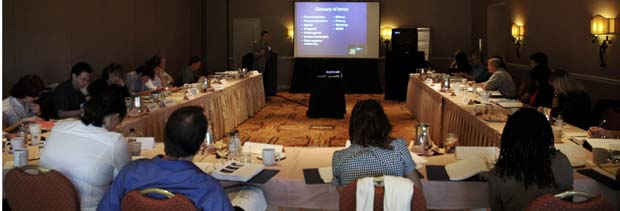 |



